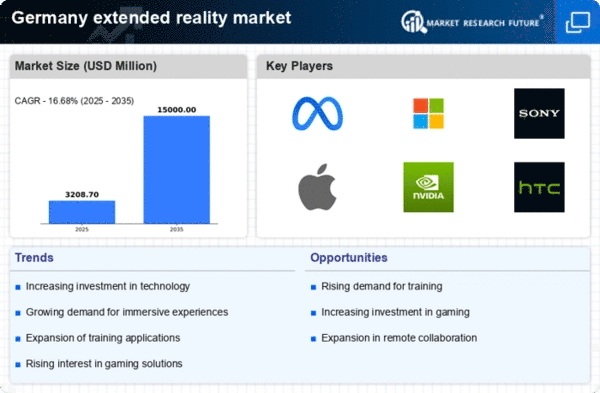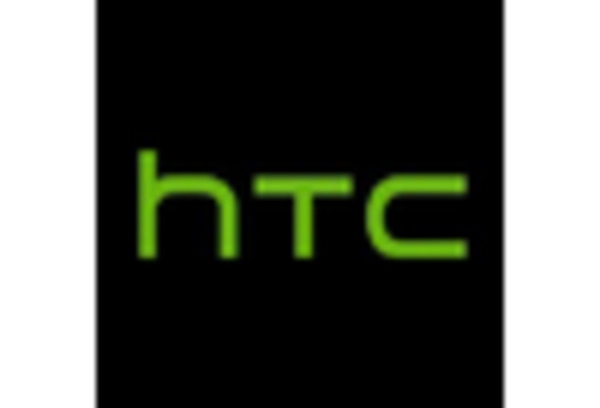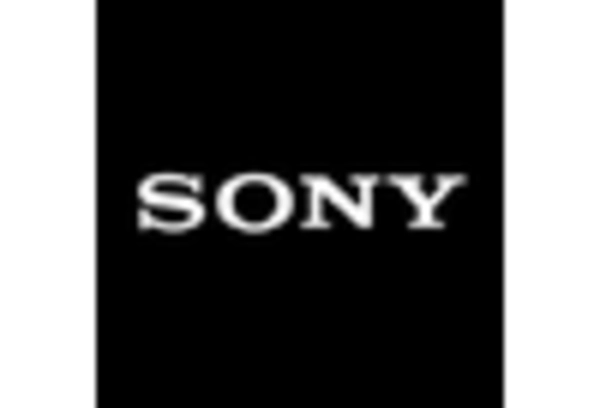Supportive Government Initiatives
The extended reality market in Germany is benefiting from supportive government initiatives aimed at fostering innovation and technological development. Various programs and funding opportunities are being introduced to encourage research and development in immersive technologies. The German government has recognized the potential of extended reality to drive economic growth and enhance competitiveness across multiple sectors. In 2025, it is projected that government funding for extended reality projects will increase by approximately 15%, further stimulating market growth. These initiatives not only provide financial support but also create a favorable environment for startups and established companies to collaborate and innovate. As a result, the extended reality market is likely to see accelerated growth driven by these supportive measures.
Expansion of the Automotive Industry
The extended reality market in Germany is being propelled by the expansion of the automotive industry, which is increasingly integrating immersive technologies into its design and manufacturing processes. Automotive companies are utilizing extended reality for virtual prototyping, design visualization, and training purposes. This integration not only enhances efficiency but also reduces costs associated with physical prototypes. In 2025, the automotive sector is anticipated to contribute significantly to the extended reality market, with investments expected to exceed €1 billion. This trend indicates a growing recognition of the value that extended reality brings to the automotive industry, as companies strive to innovate and remain competitive. As the automotive sector continues to evolve, the extended reality market is likely to benefit from increased collaboration and investment.
Technological Advancements in Hardware
The extended reality market in Germany is experiencing a surge due to rapid advancements in hardware technology. Innovations in headsets, sensors, and computing power are enhancing user experiences and making extended reality applications more accessible. For instance, the introduction of lightweight, high-resolution headsets has improved comfort and usability, leading to increased adoption across various sectors. In 2025, the market for extended reality hardware in Germany is projected to reach approximately $3 billion, reflecting a growth rate of around 25% annually. This growth is driven by both consumer demand and enterprise applications, as businesses seek to leverage immersive technologies for training, design, and collaboration. As hardware continues to evolve, it is likely to further stimulate the extended reality market, attracting new users and applications.
Growing Interest in Educational Applications
The extended reality market in Germany is witnessing a notable increase in interest from the education sector. Educational institutions are increasingly adopting immersive technologies to enhance learning experiences and improve student engagement. Extended reality applications, such as virtual labs and interactive simulations, allow students to explore complex concepts in a more tangible manner. In 2025, the market for educational extended reality solutions is projected to grow by approximately 20%, driven by the need for innovative teaching methods and the integration of technology in classrooms. This growth reflects a broader trend towards personalized and experiential learning, which is becoming essential in modern education. As educational institutions continue to embrace these technologies, the extended reality market is expected to flourish.
Rising Demand for Remote Collaboration Tools
The extended reality market in Germany is significantly influenced by the increasing demand for remote collaboration tools. As organizations adapt to hybrid work models, immersive technologies are being utilized to facilitate virtual meetings, training sessions, and collaborative projects. Extended reality solutions provide a more engaging and interactive experience compared to traditional video conferencing tools. In 2025, it is estimated that the market for remote collaboration tools using extended reality will account for nearly 30% of the overall market share in Germany. This trend indicates a shift towards more effective communication methods, as companies recognize the potential of extended reality to enhance productivity and teamwork. Consequently, the extended reality market is likely to expand as businesses invest in these innovative solutions.
















